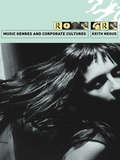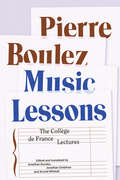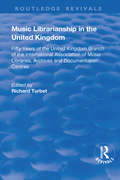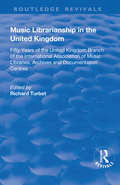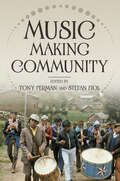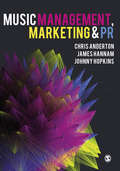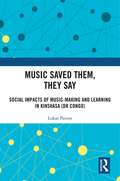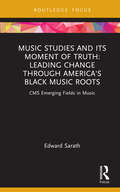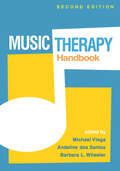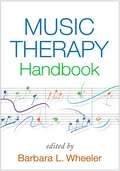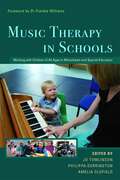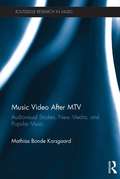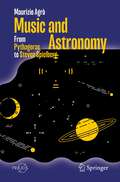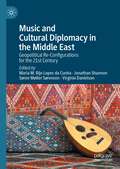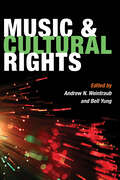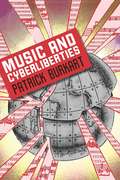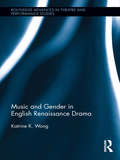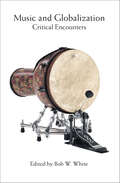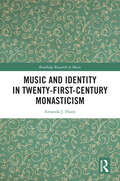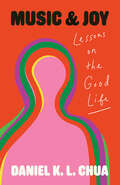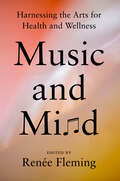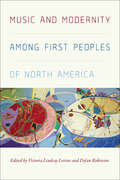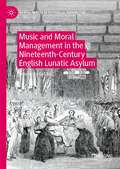- Table View
- List View
Music Genres and Corporate Cultures
by Keith NegusMusic Genres and Corporate Cultures explores the seemingly haphazard workings of the music industry, tracing the uneasy relationship between economics and culture; `entertainment corporations' and the artists they sign. Keith Negus examines the contrasting strategies of major labels like Sony and Polygram in managing different genres, artists and staff. How do takeovers affect the treatment of artists? Why has Polygram been perceived as too European to attract US artists? And how did Warner's wooden floors help them sign Green Day? Through in-depth case studies of three major genres; rap, country, and salsa, Negus explores the way in which the music industry recognises and rewards certain sounds, and how this influences both the creativity of musicians, and their audiences. He examines the tension between raps public image as the spontaneous `music of the streets' and the practicalities of the market, and asks why country labels and radio stations promote top-selling acts like Garth Brooks over hard-to-classify artists like Mary Chapin-Carpenter, and how the lack of soundscan systems in Puerto Rican record shops affects salsa music's position on the US Billboard chart. Drawing on over seventy interviews with music industry personnel in Britain and the United States, Music Genres and Corporate Cultures shows how the creation, circulation and consumption of popular music is shaped by record companies and corporate business styles while stressing that music production takes within a broader culture, not totally within the control of large corporations.
Music Lessons: The Collège de France Lectures
by Pierre BoulezThe eminent French composer’s groundbreaking lectures, available for the first time in English: “a major event” (Alex Ross).Music Lessons collects the yearly lectures of French composer Pierre Boulez, prepared for the Collège de France between 1976 and 1995. These lectures offer a sustained intellectual engagement with themes of creativity in music by a widely influential cultural figure, who has long been central to the conversation around contemporary music. In his essays Boulez explores the process through which a musical idea is realized in a full-fledged composition; the complementary roles of craft and inspiration; the degree to which the memory of other musical works can influence and change the act of creation; and other deeply fascinating topics. Boulez also gives a penetrating account of problems in classical music that are still present today, such as the crippling conservatism of many musical institutions. Woven into the discussion are stories of Boulez’s own compositions and those of fellow composers whose work he championed, as both a critic and conductor: from Stravinsky to Stockhausen and Varèse, from Bartók to Berg, Debussy to Mahler and Wagner, and all the way back to Bach.This edition includes a foreword by Jean-Jacques Nattiez and a preface by Jonathan Goldman.
Music Librarianship in the UK: Fifty Years of the British Branch of the International Association of Music Librarians
by Richard TurbetThis title was first published in 2003. The UK branch of the International Association of Music Libraries was founded in 1953. This volume of specially commissioned essays celebrates the golden jubilee of branch's foundation and surveys the achievements of the last 50 years. With an emphasis on practical music librarianship, the essays examine the challenges that have faced the profession in recent years, as well as current developments in the field and the impact of modern advances in information technology.
Music Librarianship in the UK: Fifty Years of the British Branch of the International Association of Music Librarians (Routledge Revivals Ser.)
by Richard TurbetThis title was first published in 2003. The UK branch of the International Association of Music Libraries was founded in 1953. This volume of specially commissioned essays celebrates the golden jubilee of branch's foundation and surveys the achievements of the last 50 years. With an emphasis on practical music librarianship, the essays examine the challenges that have faced the profession in recent years, as well as current developments in the field and the impact of modern advances in information technology.
Music Making Community
by Bruno Nettl Joanna Bosse Stefan Fiol Stephen Blum Veit Erlmann Eduardo Herrera Ioannis Tsekouras Donna A Buchanan Thomas Solomon Sylvia Bruinders David A McDonald Rick DejaMaking music offers enormous possibilities--and faces significant limitations--in its power to generate belonging and advance social justice. Tony Perman and Stefan Fiol edit essays focused on the forms of interplay between music-making and community-making as mutually creative processes. Contributors in the first section look at cases where music arrived in settings with little or no sense of community and formed social bonds that lasted beyond its departure. In the sections that follow, the essayists turn to stable communities that used musical forms to address social needs and both forged new social groups and, in some cases, splintered established communities. By centering the value of difference in productive feedback dynamics of music and community while asserting the need for mutual moral indebtedness, they foreground music’s potential to transform community for the better. Contributors: Stephen Blum, Joanna Bosse, Sylvia Bruinders, Donna A. Buchanan, Rick Deja, Veit Erlmann, Stefan Fiol, Eduardo Herrera, David A. McDonald, Tony Perman, Thomas Solomon, and Ioannis Tsekouras
Music Management, Marketing and PR
by Chris Anderton James Hannam Johnny HopkinsThis book is your guide to the study and practice of music management and the fast-moving music business of the 21st century. Covering a range of careers, organisations, and practices, this expert introduction will help aspiring artists, managers, and executives to understand and succeed in this exciting sector. Featuring exclusive interviews with industry experts and discussions of well-known artists, it covers key areas such as artist development, the live music sector, fan engagement, and copyright. Other topics include: Managing contracts and assembling teams. Using data audits of platforms to adapt campaigns. Shaping opinions about music, musicians, events. How the music industry can be more diverse, inclusive, and equitable for the benefit of all. Working with venues, promoters, booking agents, and tour managers. Branding, sponsorship, and endorsement. Funding, crowdsourcing and royalty collection. Ongoing digital developments such as streaming income and algorithmic recommendation. Balancing the creative and the commercial, it is essential reading for students of music management, music business, and music promotion – and anybody looking to build their career in the music industries. Dr Chris Anderton, Johnny Hopkins, and James Hannam all teach on the BA Music Business at the Faculty of Business, Law and Digital Technologies at Solent University, Southampton, UK.
Music Management, Marketing and PR
by Chris Anderton James Hannam Johnny HopkinsThis book is your guide to the study and practice of music management and the fast-moving music business of the 21st century. Covering a range of careers, organisations, and practices, this expert introduction will help aspiring artists, managers, and executives to understand and succeed in this exciting sector. Featuring exclusive interviews with industry experts and discussions of well-known artists, it covers key areas such as artist development, the live music sector, fan engagement, and copyright. Other topics include: Managing contracts and assembling teams. Using data audits of platforms to adapt campaigns. Shaping opinions about music, musicians, events. How the music industry can be more diverse, inclusive, and equitable for the benefit of all. Working with venues, promoters, booking agents, and tour managers. Branding, sponsorship, and endorsement. Funding, crowdsourcing and royalty collection. Ongoing digital developments such as streaming income and algorithmic recommendation. Balancing the creative and the commercial, it is essential reading for students of music management, music business, and music promotion – and anybody looking to build their career in the music industries. Dr Chris Anderton, Johnny Hopkins, and James Hannam all teach on the BA Music Business at the Faculty of Business, Law and Digital Technologies at Solent University, Southampton, UK.
Music Saved Them, They Say: Social Impacts of Music-Making and Learning in Kinshasa (DR Congo)
by Lukas PaironMusic Saved Them, They Say: Social Impacts of Music-Making and Learning in Kinshasa (DR Congo) explores the role music-making has played in community projects run for young people in the poverty-stricken and often violent surroundings of Kinshasa, the capital city of the Democratic Republic of the Congo. The musicians described here – former gang members and so-called "witch children" living on the streets – believe music was vital in (re)constructing their lives. Based on fieldwork carried out over the course of three-and-a-half years of research, the study synthesizes interviews, focus group sessions, and participant observation to contextualize this complicated cultural and social environment. Inspired by those who have been "saved by music", Music Saved Them, They Say seeks to understand how structured musical practice and education can influence the lives of young people in such difficult living conditions, in Kinshasa and beyond. "... a tribute to the persistence, engagement and courage of the people in these projects, who can be proud that their work is now exposed to a global audience, not just of researchers but also to practitioners around the world who could learn from and be inspired by these hitherto unknown projects." —John Sloboda, Research Professor, Guildhall School of Music & Drama
Music Studies and Its Moment of Truth: CMS Emerging Fields in Music (CMS Emerging Fields in Music)
by Edward SarathMusic Studies and Its Moment of Truth: Leading Change through America’s Black Music Roots presents a new framework for racial justice discourse in the context of music studies and education. Centering on Black American Music, the book issues challenges to both the conventional music studies paradigm and decades-old reform efforts. While Black American Music ranks high among America’s contributions to world culture, and offers musicians powerful tools for musical practice and understanding, this musical legacy remains remarkably marginalized even in activist conversations. The author argues that this reflects lingering and unexamined racist patterns that persist even among the most fervent voices for anti-racist interventions, and addresses the need for a higher-order activist framework within music studies. Delving further into the transformative changes needed to pursue racial justice, the short pieces collected in this book discuss topics including a shift from multicultural ideology to a transcultural model of musical pluralism, analysis of the multi-tiered nature of musical racism, the whitewashing of music studies activism, K-12 music teacher education as the locus for paradigmatic change and the potential for a transformed model of music studies to catalyze an overarching revolution in creativity and consciousness in both education and society at large. Critiquing the failures of progressive reform efforts and conventional reaction, this book argues that major changes are needed to the discourse on racism in music studies, and envisions new paradigms for the future.
Music Studies and Its Moment of Truth: CMS Emerging Fields in Music (CMS Emerging Fields in Music)
by Edward SarathMusic Studies and Its Moment of Truth: Leading Change through America’s Black Music Roots presents a new framework for racial justice discourse in the context of music studies and education. Centering on Black American Music, the book issues challenges to both the conventional music studies paradigm and decades-old reform efforts.While Black American Music ranks high among America’s contributions to world culture, and offers musicians powerful tools for musical practice and understanding, this musical legacy remains remarkably marginalized even in activist conversations. The author argues that this reflects lingering and unexamined racist patterns that persist even among the most fervent voices for anti-racist interventions, and addresses the need for a higher-order activist framework within music studies.Delving further into the transformative changes needed to pursue racial justice, the short pieces collected in this book discuss topics including a shift from multicultural ideology to a transcultural model of musical pluralism, analysis of the multi-tiered nature of musical racism, the whitewashing of music studies activism, K-12 music teacher education as the locus for paradigmatic change and the potential for a transformed model of music studies to catalyze an overarching revolution in creativity and consciousness in both education and society at large. Critiquing the failures of progressive reform efforts and conventional reaction, this book argues that major changes are needed to the discourse on racism in music studies, and envisions new paradigms for the future.
Music Therapy Handbook
by Barbara L. Wheeler Michael Viega Andeline Dos SantosRich with case material, the second edition of this respected text has been thoroughly revised with many new contributing authors and 85% new material. The Handbook comprehensively explores music therapy theory, research, and practice. Chapters cover foundational concepts and therapeutic processes, major approaches to practice, and clinical applications with people of all ages. The second edition has a heightened focus on diversity, equity, inclusion, accessibility, and cultural humility. Expert contributors describe state-of-the-art practices for using music to foster clients' well-being and recovery in a broad range of mental health, medical, and community settings. New to This Edition Expanded coverage of working with marginalized communities, including racially minoritized, refugee, LGBTQIA+, and neurodiverse clients, and an increased emphasis on therapist reflexivity. Provides an integrated conceptual framework for understanding different music therapy approaches. First edition editor Barbara L. Wheeler is joined by Michael Viega and Andeline dos Santos, who bring fresh perspectives and a more international scope.
Music Therapy Handbook (Creative Arts and Play Therapy)
by Barbara L. WheelerRich with case material, this groundbreaking volume provides a comprehensive overview of music therapy, from basic concepts to emerging clinical approaches. Experts review psychodynamic, humanistic, cognitive-behavioral, and developmental foundations and describe major techniques, including the Nordoff-Robbins model and the Bonny Method of Guided Imagery and Music. An expansive section on clinical applications examines music therapy with children and adults, as well as its recognized role in medical settings. Topics include autism spectrum disorder, school interventions, brain injury, and trauma. An authoritative resource for music therapists, the book also shows how music can be used by other mental health and medical professionals. The companion website features audio downloads illustrative of the Nordoff-Robbins model.
Music Therapy in Schools
by Amelia Oldfield Jo Tomlinson Philippa DerringtonThe majority of music therapy work with children takes place in schools. This book documents the wealth and diversity of work that music therapists are doing in educational settings across the UK. It shows how, in recent years, music therapy has changed and grown as a profession, and it provides an insight into the trends that are emerging in this area in the 21st century. Collating the experiences of a range of music therapists from both mainstream and special education backgrounds, Music Therapy in Schools explains the procedures, challenges and benefits of using music therapy in an educational context. These music therapists have worked with children of all ages and abilities from pre-school toddlers in nursery schools to teenagers preparing for further education, and address specific issues and disabilities including working with children with emotional and behavioural problems, and autistic spectrum disorders. This book will be essential reading for music therapists, music therapy students and educational professionals.
Music Video After MTV: Audiovisual Studies, New Media, and Popular Music (Routledge Research in Music)
by Mathias Bonde KorsgaardSince the 1980s, music videos have been everywhere, and today almost all of the most-viewed clips on YouTube are music videos. However, in academia, music videos do not currently share this popularity. Music Video After MTV gives music video its due academic credit by exploring the changing landscapes surrounding post-millennial music video. Across seven chapters, the book addresses core issues relating to the study of music videos, including the history, analysis, and audiovisual aesthetics of music videos. Moreover, the book is the first of its kind to truly address the recent changes following the digitization of music video, including its changing cycles of production, distribution and reception, the influence of music videos on other media, and the rise of new types of online music video. Approaching music videos from a composite theoretical framework, Music Video After MTV brings music video research up to speed in several areas: it offers the first account of the research history of music videos, the first truly audiovisual approach to music video studies and it presents numerous inspiring case studies, ranging from classics by Michel Gondry and Chris Cunningham to recent experimental and interactive videos that interrogate the very limits of music video.
Music and Astronomy: From Pythagoras to Steven Spielberg (Springer Praxis Books)
by Maurizio AgròThis book explores the profound and ancient relationship between music and astronomy. Throughout history, Music has occupied a significant place among the disciplines of the Quadrivium, which also include Geometry, Arithmetic, and Astronomy. The captivating bond between these two realms has not only inspired eminent scientists like Kepler, Newton, and Einstein, but has also captured the imagination of NASA and astronauts in modern times. The author delves into various aspects of the intersection between music and astronomy, encompassing everything from ancient cosmological beliefs to groundbreaking discoveries such as the cosmic background radiation and gravitational waves. This enthralling theme has not only stimulated renowned artists like David Bowie and Elton John, but has also served as a muse for movies like Close Encounters of the Third Kind. Within the book, readers will find an extensive photo gallery and a specially curated soundtrack that enhances the reading experience. It caters to a broad audience, appealing to those with a general interest in both music and astronomy, as well as to specialized individuals in either field of study.
Music and Cultural Diplomacy in the Middle East: Geopolitical Re-Configurations for the 21st Century
by Virginia Danielson Maria M. Rijo Lopes da Cunha Jonathan Shannon Søren Møller SørensenThis edited volume offers innovative perspectives on the study of music as cultural diplomacy in the Middle East and North Africa (MENA), a region often overlooked in such discussions. It offers an innovative contribution to the field of ethnomusicology, as well as political science and international relations, by highlighting the agency of non-state actors (local voices, communities, and grassroots organizations), thereby contributing towards de-centering the state, hitherto conceived as the chief player in cultural diplomacy.This volume is divided into four main parts organized along the following themes: 1. History and Historiography, 2. Migration, Diaspora, and Ethics, 3. Statecraft and Music Making, and 4. Affective and Sensorial Diplomacy. The perspectives offered in this volume offer a deeper exploration of bottom-up initiatives of cultural diplomacy through music, instead of the more usual analyses of top-down, state-directed programmes. Overall, the aim is to reconceptualize Middle Eastern, North African and Arab Gulf musical practices in their relationship to power and cultural diplomacy in order build a broader and pluri-dimensional account of these contentious relationships.
Music and Cultural Rights
by Helen Rees Andrew N. Weintraub Adriana Helbig Nimrod Baranovitch Javier F León Ana María Ochoa Silvia Ramos Felicia Sandler Amy Ku'Uleialoha Stillman Ricardo D Trimillos Bell YungFraming timely and pressing questions concerning music and cultural rights, this collection illustrates the ways in which music--as a cultural practice, a commercial product, and an aesthetic form--has become enmeshed in debates about human rights, international law, and struggles for social justice. The essays in this volume examine how interpretations of cultural rights vary across societies; how definitions of rights have evolved; and how rights have been invoked in relation to social struggles over cultural access, use, representation, and ownership. The individual case studies, many of them based on ethnographic field research, demonstrate how musical aspects of cultural rights play out in specific cultural contexts, including the Philippines, China, Hawaii, Peru, Ukraine, and Brazil. Contributors are Nimrod Baranovitch, Adriana Helbig, Javier F. Leon, Ana María Ochoa, Silvia Ramos, Helen Rees, Felicia Sandler, Amy Ku'uleialoha Stillman, Ricardo D. Trimillos, Andrew N. Weintraub, and Bell Yung.
Music and Cyberliberties (Music Culture)
by Patrick BurkartMusicians and music fans are at the forefront of cyberliberties activism, a movement that has tried to correct the imbalances that imperil the communal and ritualistic sharing and distribution of music. In Music and Cyberliberties, Patrick Burkart tracks the migration of music advocacy and anti-major label activism since the court defeat of Napster and the ascendancy of the so-called Celestial Jukebox model of music e-commerce, which sells licensed access to music. Music and Cyberliberties identifies the groups--alternative and radical media activists, culture jammers, hackers, netlabels, and critical legal scholars--who are pushing back against the "copyright grab" by major labels for the rights and privileges that were once enjoyed by artists and fans. Burkart reflects on the emergence of peer-to-peer networking as a cause celebre that helped spark the movement, and also lays out the next stages of development for the Celestial Jukebox that would quash it. By placing the musical activist groups into the larger context of technology and new social movement theory, Music and Cyberliberties offers an exciting new way of understanding the technological and social changes we confront daily.
Music and Gender in English Renaissance Drama (Routledge Advances in Theatre & Performance Studies)
by Katrine K. WongThis book offers a survey of how female and male characters in English Renaissance theatre participated and interacted in musical activities, both inside and outside the contemporary societal decorum. Wong’s analysis broadens our understanding of the general theatrical representation of music, or musical dramaturgy, and complicates the current discussion of musical portrayal and construction of gender during this period. Wong discusses dramaturgical meanings of music and its association with gender, love, and erotomania in Renaissance plays. The negotiation between the dichotomous qualities of the heavenly and the demonic finds extensive application in recent studies of music in early modern English plays. However, while ideological dualities identified in music in traditional Renaissance thinking may seem unequivocal, various musical representations of characters and situations in early modern drama would prove otherwise. Wong, building upon the conventional model of binarism, explores how playwrights created their musical characters and scenarios according to the received cultural use and perception of music, and, at the same time, experimented with the multivalent meanings and significance embodied in theatrical music.
Music and Globalization: Critical Encounters (Tracking Globalization)
by Bob W. White"World music" emerged as a commercial and musical category in the 1980s, but in some sense music has always been global. Through the metaphor of encounters, Music and Globalization explores the dynamics that enable or hinder cross-cultural communication through music. In the stories told by the contributors, we meet well-known players such as David Byrne, Peter Gabriel, Sting, Ry Cooder, Fela Kuti, and Gilberto Gil, but also lesser-known characters such as the Senegalese Afro-Cuban singer Laba Sosseh and Raramuri fiddle players from northwest Mexico. This collection demonstrates that careful historical and ethnographic analysis of global music can show us how globalization operates and what, if anything, we as consumers have to do with it.
Music and Identity in Twenty-First-Century Monasticism (Routledge Research in Music)
by Amanda J. HasteTwenty-first-century monastic communities represent unique social environments in which music plays an integral part. This book examines the role of music in Catholic, Anglican/Episcopalian and neo-monastic communities in Britain and North America, engaging closely with communities of practice to provide a penetrating insight into the role of music in self-care and as a vector for identity construction on both individual and community levels. The author explores the essential role of music in community dynamics, the rationale for using instruments, the implications of both chant-based and freestyle composition, gender-related differences in musical activity, the role of dance (‘music made visible’) in community life, the commodification of monastic music, the ‘Singing Nun’ phenomenon and the role of music in established and emerging neo-monastic communities. The result is a comprehensive and compelling study of the agency of music in the construction and expression of personal and community identity.
Music and Joy: Lessons on the Good Life
by Daniel K. ChuaFrom Confucius to Saint Augustine and Beethoven to the blues, a rediscovery of the joy that is music In this revelatory book, Daniel K. L. Chua asks a simple question: Is music joy? For Chua, the answer is a resounding yes—music is a lesson in joy that teaches us how to live well. But to hear this ancient knowledge, he says, we have to attend to a music that is so much greater than our greatest hits. Drawing on extensive sources, from the Confucian classics to the writings of Saint Augustine, Chua&’s book is a globe‑trotting, time‑traveling, mind‑boggling journey to rediscover the joy that is music. Using examples from Beethoven to the blues and from philosophy and theology to music theory, Chua updates the relation between music and joy and argues for its relevance in the face of our many political and environmental crises. He opens our ears to a music that is the very definition of joy for today&’s troubled world.
Music and Mind: Harnessing the Arts for Health and Wellness
by Edited by Renée Fleming"This book inspires us all to immerse ourselves in the vast potential of music and other creative arts to heal our wounds, sharpen our minds, enliven our bodies, and restore our broken connections.&” —Bessel van der Kolk, #1 New York Times bestselling author of The Body Keeps the ScoreWorld-renowned soprano and arts/health advocate Renée Fleming curates a collection of essays from leading scientists, artists, creative arts therapists, educators, and healthcare providers about the powerful impacts of music and the arts on health and the human experienceChapters include: Ann Patchett, &“How to Fall in Love with Opera&” Yo-Yo Ma, &“Nature, Culture, and Healing&”Aniruddh D. Patel, &“Musicality, Evolution, and Animal Responses to Music&”Richard Powers, &“The Parting Glass"Daniel J. Levitin, &“What Does It Mean to be Musical?&” Anna Deavere Smith, &“Healing Arts&” Rosanne Cash, &“Rabbit Hole&” Rhiannon Giddens, &“How Music Shows Us What It Means to Be Human&”Robert Zatorre, &“Musical Enjoyment and the Reward Circuits of the Brain&”Concetta Tomaino, &“Music and Memory&”A compelling and growing body of research has shown music and arts therapies to be effective tools for addressing a widening array of conditions, from providing pain relief andalleviating anxiety and depression to regaining speech after stroke or traumatic brain injury, and improving mobility for people with disorders that include Parkinson&’s disease and MS.In Music and Mind Renée Fleming draws upon her own experience as an advocate to showcase the breadth of this booming field, inviting leading experts to share their discoveries. In addition to describing therapeutic benefits, the book explores evolution, brain function, childhood development, and technology as applied to arts and health.Much of this area of study is relatively new, made possible by recent advances in brain imaging, and supported by theNational Institutes of Health, major hospitals, and universities. This work is sparking an explosion of public interest in the arts and health sector.Fleming has presented on this material in over fifty cities across North America, Europe, and Asia, collaborating with leading researchers, policy-makers, and practitioners. With essays from notable musicians, writers, and artists, as well as leading neuroscientists, Music and Mind is a groundbreaking book, the perfect introduction and overview of this exciting new field.
Music and Modernity among First Peoples of North America (Music / Culture Ser.)
by Victoria Lindsay Levine Dylan RobinsonMusic and Modernity among First Peoples of North America is a collaboration between Indigenous and settler scholars from both Canada and the United States. The contributors explore the intersections between music, modernity, and Indigeneity in essays addressing topics that range from hip-hop to powwow, and television soundtracks of Native Classical and experimental music. Working from the shared premise that multiple modernities exist for Indigenous peoples, the authors seek to understand contemporary musical expression from Native perspectives and to decolonize the study of Native American/First Nations music. The essays coalesce around four main themes: innovative technology, identity formation and self-representation, political activism, and translocal musical exchange. Closely related topics include cosmopolitanism, hybridity, alliance studies, code-switching, and ontologies of sound. Featuring the work of both established and emerging scholars, the collection demonstrates the centrality of music in communicating the complex, diverse lived experience of Indigenous North Americans in the twenty-first century and brings ethnomusicology into dialogue with critical Indigenous studies.
Music and Moral Management in the Nineteenth-Century English Lunatic Asylum (Mental Health in Historical Perspective)
by Rosemary GoldingThis book traces the role played by music within asylums, the participation of staff and patients in musical activity, and the links drawn between music, health, and wellbeing. In the first part of the book, the author draws on a wide range of sources to investigate the debates around moral management, entertainment, and music for patients, as well as the wider context of music and mental health. In the second part, a series of case studies bring to life the characters and contexts involved in asylum music, selected from a range of public and private institutions. From asylum bands to chapel choirs, smoking concerts to orchestras, the rich variety of musical activity presents new perspectives on music in everyday life. Aspects such as employment practices, musicians’ networks and the purchase and maintenance of musical instruments illuminate the ‘business’ of music as part of moral management. As a source of entertainment and occupation, a means of solace and self-control, and as a device for social gatherings and contact with the outside world, the place of music in the asylum offers valuable insight into its uses and meanings in nineteenth-century England.
